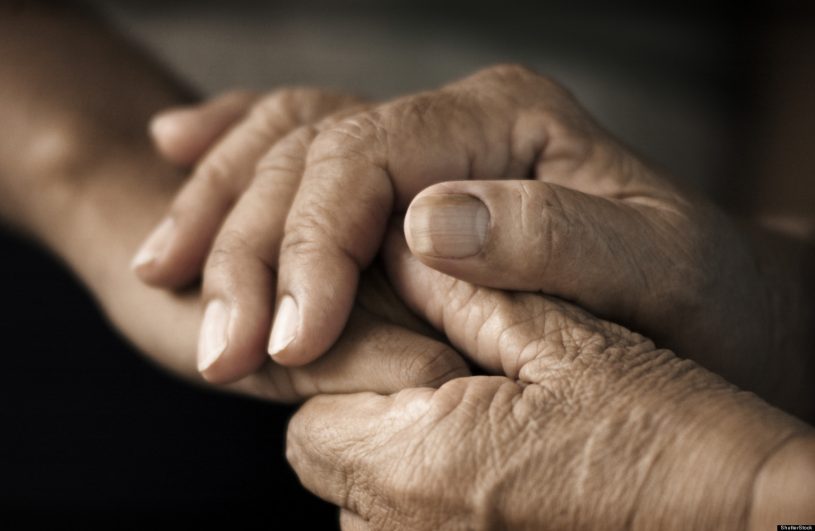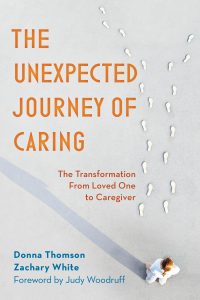The Unexpected Journey of Caring
The Moment You Realize Something Has Changed
Despite what you call yourself, or whether you acknowledge you are a caregiver, there is a moment. The moment when you can’t escape the realization that life as it once was will never be the same. The moment the permanence of a loved one’s diagnosis becomes real. The moment a loved one can no longer remember your name. The moment you realize that no matter what you do, a cure won’t be possible.
The moment you are reminded that it is you, and you alone, who are responsible for complete and ongoing care. Even before others notice, you may begin mourning for what can never be, as others around you keep going and moving while your world no longer makes sense. Even though you may look and sound the same to others, you are not. You can’t be.
The safety net of habit and routine is replaced by a heightened sense that life is fragile and unpredictable. It’s as if you find yourself walking on a tightrope without a net. And the scariest part is that you may have been living all this time without a net but had never noticed until now.
But now that you do notice, you can’t unlearn what you know and return to life as it once was. Every caregiving experience is different, but behind every caregiver story is a moment—a moment when you realize that the care and love you are called to provide can’t help but change you in every way possible.
A New Way of Seeing and Being
Personal transformation is usually an experience we actively seek out—not one that hunts us down. In the twenty-first century, becoming a caregiver is a transformation that comes at us, requiring us to rethink everything we once knew. When a loved one becomes a caregiver, everything changes—responsibilities, beliefs, hopes, expectations, and relationships. “Being” a caregiver is not something most people think about or dream about, let alone prepare for, because this role and relationship seemingly defies understanding. Rarely, if ever, will you hear caregivers speak of themselves as a class or group.
Caregivers don’t allow themselves the privilege and comfort of the “we” because there is no union of caregivers, simply a legion of “I’s” doing and being and serving. Not seeing ourselves as part of something larger than our own individual experiences comes at a cost.
Disorientation: From Loved One to Caregiver
Everyone seeks transformation. To be changed and catapulted into something other than who you are—the better, stronger, fiercer version of yourself. Transformations are always impressive and awe inspiring. But before anyone is transformed, something else has to happen. This isn’t the part of the transformational process that most people pay attention to because it’s all about what happens before others begin noticing how you are different. This is about what happens to you in private—precisely when you are alone in your thoughts while the rest of the world moves on and forward as if nothing is changing.
What is it that happens before anyone can experience transformation? Disorientation. Look up the word “disorient,” [1] and you’ll find that it’s the opposite of “enlighten.” Who would want to spend time trying to figure out the very aspects of their experiences that are so confusing and messy? Somewhere along our care journey, we will experience disorientation. Like an unexpected attack of vertigo—the world around us is turned upside down, transforming everything we once saw, believed, and expected into something that throws us off balance. Caregiver disorientation is not like a one-time vertigo attack but one that we experience at different times with differing degrees of intensity. Bouts of disorientation can knock us off our feet. They can make us question ourselves and everything we’ve taken for granted. They can keep us from wanting to get out of bed. And they can make us nauseous—not the kind of nausea most other people think about, though. This kind of nausea can bring us to our knees and can make us feel out of sorts when we close our eyes. It can find us while we are doing what used to bring us great joy and pleasure. And it can even hunt us down when we are with people who used to bring us so much comfort.
If we ignore our inevitable feelings of being overwhelmed, confused, angry, defiant, helpless, and deeply alone, then we are denying vital parts of our experiences that are transforming us. Since caregiving is always different from what we imagined it to be (not that any of us imagined our caregiver role in advance), our disorientation can be deep, intense, and lonely. This book is written to help you begin making sense of the very experiences that transform you throughout your caregiver role. There is no logical progression to these experiences of disorientation because each of our care roles is distinct, based on the type of care we are providing; the circumstances; the quality of our relationship with our loved one; the kind of condition, illness, or life interruption our loved one is enduring; our own care expectations; and the support we feel (or don’t feel) from others in our care roles.
Despite these differences, it’s important to remember that the reasons for our disorientation aren’t just about us. No, disorientation is an inevitable by-product of what happens when care meets love, especially when we can’t be prepared for what this role asks us to do and become.
Some of us are in the midst of experiencing these transformational moments of disorientation. Others may be trying to make sense of what happened when they provided care for a loved one days, months, and years ago. And some may be anticipating a care role they see coming at them.
Practicing Value Articulation
Caregivers may find it difficult to communicate the value of their presence against a cultural backdrop that associates time, attention, and effort with discernible outcomes. Since doing and curing receives attention and accolades, articulating the value of your role may be met with others’ prejudices. As with other care roles, [28] shifting the focus away from what is done to what you are learning from being a caregiver not only may expand others’ understandings of your role, but it may also highlight what you are gaining from your experiences. This shift in emphasis may allow you to more fully communicate your distinctive and innovative relational insights because they help tell a compelling story about what it means to connect with another human being. [29]
A willingness to venture forth with another without the comforting predictability of what will come next is a relational innovation that is becomingly increasingly scarce. This kind of innovation takes courage and risk, and caregivers are an embodiment of those willing to risk closeness without knowing what will happen tomorrow. While others fret over the possibility of losing control, care innovators like you continue caring even when controlling what will happen next is impossible. By featuring what can be understood only as a result of care interactions, caregivers can situate themselves as pioneers venturing into deeply authentic interactions at a time when most others are finding it increasingly difficult to know what it means to be with another.

When thinking of your experiences as a type of invention, rather than simply a requirement or set of tasks, caregiving can be re-positioned as a desirable source of insight. What does it mean to be needed? Doesn’t your care relationship make you imminently qualified to be able to help others begin to understand what a relationship based on love, need, and care looks like and how it shapes a relationship? What does it mean to live a life where procrastination is not possible? Aren’t you an expert here because what you experience with your loved one can’t be delayed because care needs can’t be put off? What does it mean to make a difference in the world? Don’t you have so much to say here because you’ve been thinking and living and reflecting on this question so much more intensely than others who have to be asked this question? You are living it. Throughout, not only have your experiences been shaping you, they also became a means by which you can begin teaching others in ways that only you can teach—what it means to make a difference by being with another.
 Excerpts from the book The Unexpected Journey of Caring: The Transformation from Loved One to Caregiver by Donna Thomson and Zachary White. Used by permission of the publisher Rowman & Littlefield. All rights reserved.
Excerpts from the book The Unexpected Journey of Caring: The Transformation from Loved One to Caregiver by Donna Thomson and Zachary White. Used by permission of the publisher Rowman & Littlefield. All rights reserved.
Notes
- Mongeau and Henningsen, “Stage Theories,” 367.
- Sandra Petronio, Boundaries of Privacy: Dialectics of Disclosure (Albany: State University of New York Press, 2002), 50–54.
- Amy Zhang and Laura Siminoff, “Silence and Cancer: Why Do Families and Patients Fail to Communicate?” Health Communication 15, no. 4 (February 2003): 422–23.







